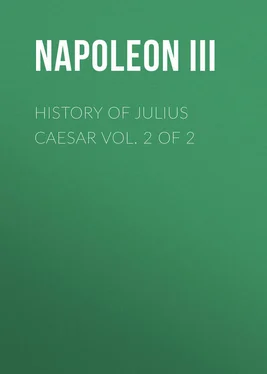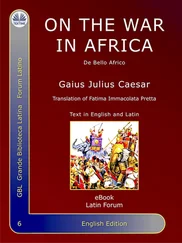Napoleon III - History of Julius Caesar Vol. 2 of 2
Здесь есть возможность читать онлайн «Napoleon III - History of Julius Caesar Vol. 2 of 2» — ознакомительный отрывок электронной книги совершенно бесплатно, а после прочтения отрывка купить полную версию. В некоторых случаях можно слушать аудио, скачать через торрент в формате fb2 и присутствует краткое содержание. Жанр: foreign_antique, foreign_prose, Биографии и Мемуары, на английском языке. Описание произведения, (предисловие) а так же отзывы посетителей доступны на портале библиотеки ЛибКат.
- Название:History of Julius Caesar Vol. 2 of 2
- Автор:
- Жанр:
- Год:неизвестен
- ISBN:нет данных
- Рейтинг книги:4 / 5. Голосов: 1
-
Избранное:Добавить в избранное
- Отзывы:
-
Ваша оценка:
- 80
- 1
- 2
- 3
- 4
- 5
History of Julius Caesar Vol. 2 of 2: краткое содержание, описание и аннотация
Предлагаем к чтению аннотацию, описание, краткое содержание или предисловие (зависит от того, что написал сам автор книги «History of Julius Caesar Vol. 2 of 2»). Если вы не нашли необходимую информацию о книге — напишите в комментариях, мы постараемся отыскать её.
History of Julius Caesar Vol. 2 of 2 — читать онлайн ознакомительный отрывок
Ниже представлен текст книги, разбитый по страницам. Система сохранения места последней прочитанной страницы, позволяет с удобством читать онлайн бесплатно книгу «History of Julius Caesar Vol. 2 of 2», без необходимости каждый раз заново искать на чём Вы остановились. Поставьте закладку, и сможете в любой момент перейти на страницу, на которой закончили чтение.
Интервал:
Закладка:
Cæsar insisted on the arguments he had already advanced: “It was not one of the principles of the Republic to abandon its allies; he did not consider that Gaul belonged to Ariovistus any more than to the Roman people. When formerly Q. Fabius Maximus vanquished the Arverni and the Ruteni, Rome pardoned them, and neither reduced them to provinces nor imposed tribute upon them. If, then, priority of conquest be invoked, the claims of the Romans to the empire of Gaul are the most just; and if it be thought preferable to refer to the Senate, Gaul ought to be free, since, after victory, the Senate had willed that she should preserve her own laws.”
During this conversation, information was brought to Cæsar that the cavalry of Ariovistus were approaching the knoll, and were throwing stones and darts at the Romans. Cæsar immediately broke up the conference, withdrew to his escort, and forbade them to return the attack, not from fear of an engagement with his favourite legion, but in order to avoid, in case he should defeat his enemies, the suspicion that he might have taken advantage of their good faith to surprise them in an interview. Nevertheless, the arrogance of Ariovistus, the disloyal attack of his cavalry, and the rupture of the conference, were soon known, and excited the ardour and impatience of the Roman troops.
Two days afterwards, Ariovistus made a proposal for a renewal of the conference, or for the sending to him of one of Cæsar’s lieutenants. Cæsar refused, the more so because, the day before, the Germans had again advanced and thrown their missiles at the Romans, and that thus his lieutenant would not have been safe from the attacks of the barbarians. He thought it more prudent to send as his deputy Valerius Procillus, the son of a Gaul who had become a Roman citizen, who spoke the Celtic language, and who was on familiar terms with Ariovistus, and M. Mettius, with whom the German king was bound by the rights of hospitality. They had hardly entered the camp of Ariovistus, when he ordered them to be thrown into fetters, under pretence that they were spies. 222
Movements of the two Armies.
VII. The same day, the German king broke up his camp and took another position at the foot of the Vosges ( sub monte ), at a distance of 6,000 paces from that of Cæsar, between Soultz and Feldkirch, not far from the Lauch. ( See Plate 6. ) Next day he crossed the Thur, near its confluence with the Ill, ascended the left banks of the Ill and the Doller, and only halted at Reiningen, after having gone two miles (three kilomètres) beyond the Roman camp. By this manœuvre, Ariovistus cut off Cæsar’s communication with Sequania and the Æduan country, but he left open the communications with the country of the Leuci and the Lingones. 223( See the Map of Gaul, 2. ) The two armies thus encamped at a short distance from each other. During the five following days, Cæsar drew out his troops each day, and formed them in order of battle at the head of his camp ( pro castris suas copias produxit ), but was not able to provoke the Germans to fight; all hostility was limited to cavalry skirmishes, in which the latter were much practised. To 6,000 horsemen was joined an equal number of picked men on foot, among whom each horseman had chosen one to watch over him in combat. According to circumstances, the horsemen fell back upon the footmen, or the latter advanced to their assistance. Such was their agility, that they kept up with the horses, running and holding by the mane. 224
Cæsar, seeing that Ariovistus persisted in shutting himself up in his camp and intercepting his communications, sought to re-establish them, chose an advantageous position about 600 paces (900 mètres) beyond that occupied by the Germans, and led thither his army drawn up in three lines. He kept the first and second under arms, and employed the third on the retrenchments. The spot on which he established himself is perhaps the eminence situated on the Little Doller, to the north of Schweighausen. Ariovistus sent thither about 16,000 of his light troops and all his cavalry, to intimidate the Romans and impede the works. Nevertheless, the third line continued them, and the two others repelled the attack. The camp once fortified, Cæsar left in it two legions and a part of the auxiliaries, and took back the four others to the principal camp. The two Roman camps were 3,600 mètres distant from each other.
Hitherto Cæsar had been satisfied with drawing out his troops and backing them upon his retrenchments; the next day, persisting in his tactics ( instituto suo ) of trying to provoke Ariovistus to fight, he drew them up at a certain distance in advance of the principal camp, and placed them in order of battle ( paulum a majoribus castris progressus, aciem instruxit ). In spite of this advanced position ( ne tum quidem ), Ariovistus persisted in not coming out. The Roman army re-entered the camp towards midday, and a part of the German troops immediately attacked the small camp. Both armies fought resolutely till evening, and there were many wounded on both sides. Astonished at seeing that, in spite of this engagement, Ariovistus still avoided a general battle, Cæsar interrogated the prisoners, and learnt that the matrons charged with consulting destiny had declared that the Germans could not be conquerors if they fought before the new moon. 225
Battle against the Germans.
VIII. Next day, leaving a sufficient guard in the two camps, Cæsar placed all his auxiliaries in view of the enemy, in advance of the smaller camp; the number of the legionaries being less than that of the Germans, he sought to conceal his inferiority from the enemy by displaying other troops. While the Germans took these auxiliaries for the two legions which occupied the lesser camp, the latter left it by the Decuman gate, and, unperceived, went to rejoin the other four. Then Cæsar drew up his six legions in three lines, and, marching forward, he led them up to the enemy’s camp ( usque ad castra hostium accessit ). This offensive movement allowed the Germans no longer the choice of avoiding battle: they quitted their camp, descended into the plain, 226drew up in line, by order of nations, at equal intervals – Harudes, Marcomanni, Suevi, Triboces, Vangiones, Nemetes, and Sedusii; and, to deprive themselves of all possibility of flight, inclosed themselves on the sides and in the rear by a circuit of carriages and wagons, on which they placed their women: dishevelled and in tears, these implored the warriors, as they marched to the battle, not to deliver them in slavery to the Romans. In this position, the Roman army faced the east, and the German army the west, and their lines extended over a space now partly covered by the forest of Nonnenbruch. 227
Cæsar, still more to animate his soldiers, determined to give them witnesses worthy of their courage, and placed at the head of each legion either one of his lieutenants or his quæstor. 228He led the attack in person, with his right wing, on the side where the Germans seemed weakest. The signal given, the legions dash forward; the enemy, on his side, rushes to the encounter. On both sides the impetuosity is so great that the Romans, not having time to use the pilum , throw it away, and fight hand to hand with the sword. But the Germans, according to their custom, to resist an attack of this kind, form rapidly in phalanxes of three or four hundred men, 229and cover their bare heads with their bucklers. They are pressed so close together, that even when dead they still remain standing. 230Such was the ardour of the legionaries, that many rushed upon these sort of tortoises, tearing away the bucklers, and striking the enemies from above. 231The short and sharp-pointed swords of the Romans had the advantage over the long swords of the Germans. 232Nevertheless, according to Appian, the legions owed their victory chiefly to the superiority of their tactics and the steadiness with which they kept their ranks. 233Ariovistus’s left did not resist long; but while it was driven back and put to flight, the right, forming in deep masses, pressed the Romans hard. Young P. Crassus, commander of the cavalry placed at a distance from the thick of the battle, and better placed to judge of its incidents, perceived this, sent the third line to the succour of the wavering legions, and restored the combat. Soon Ariovistus’s right was obliged to give way in its turn; the rout then became general, and the Germans desisted from flight only when they reached the Rhine, fifty miles from the field of battle. 234They descended, no doubt, the valley of the Ill as far as Rhinau, thus retracing a part of the road by which they had come. ( See Plate 4. ) Cæsar sent his cavalry after them; all who were overtaken were cut to pieces; the rest attempted to swim across the river, or sought safety in boats. Among the latter was Ariovistus, who threw himself into a boat 235he found attached to the bank. According to Plutarch and Appian, 23680,000 men perished in the combat and during the pursuit. Two of the wives of the German king experienced the same fate; one was a Sueve, the other a Norician. Of his two daughters, one was killed and the other taken prisoner. Cæsar says that, as he himself pursued the enemy with his cavalry, he experienced a pleasure equal to that given by victory when he recovered, first Procillus, loaded with a triple chain, and who had thrice seen the barbarians draw lots whether he should be burnt alive or not, and, subsequently, M. Mettius, both of whom, as we have seen, had been sent by him as messengers to Ariovistus.
Читать дальшеИнтервал:
Закладка:
Похожие книги на «History of Julius Caesar Vol. 2 of 2»
Представляем Вашему вниманию похожие книги на «History of Julius Caesar Vol. 2 of 2» списком для выбора. Мы отобрали схожую по названию и смыслу литературу в надежде предоставить читателям больше вариантов отыскать новые, интересные, ещё непрочитанные произведения.
Обсуждение, отзывы о книге «History of Julius Caesar Vol. 2 of 2» и просто собственные мнения читателей. Оставьте ваши комментарии, напишите, что Вы думаете о произведении, его смысле или главных героях. Укажите что конкретно понравилось, а что нет, и почему Вы так считаете.












